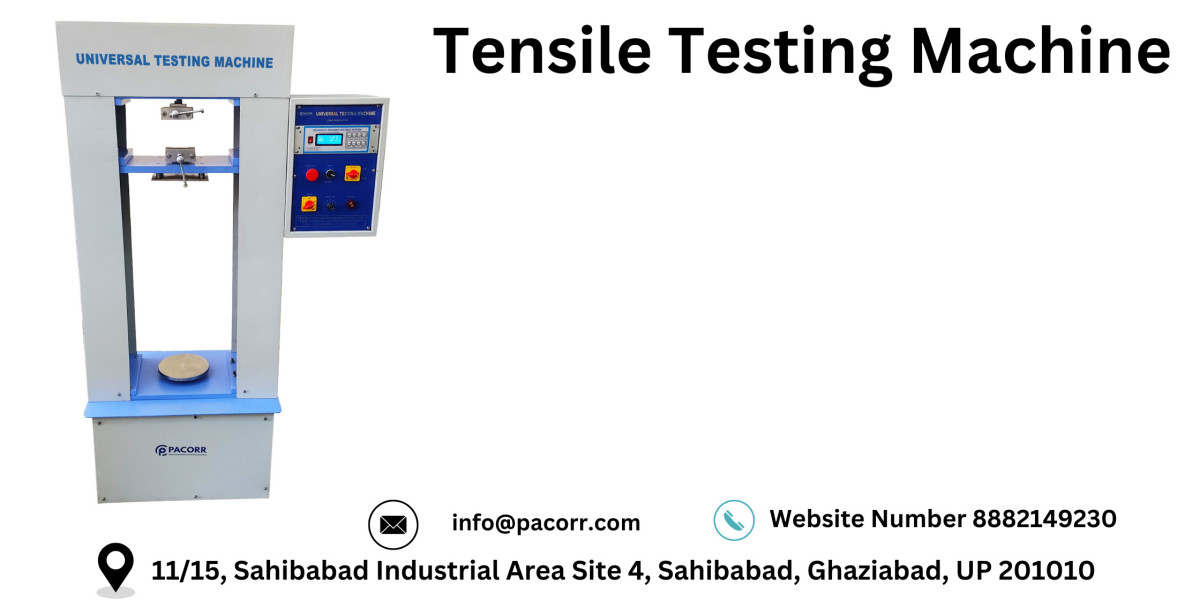In the world of material testing, tensile testing machines stand out as essential tools for determining the mechanical properties of materials. These machines are critical for manufacturers across various industries, providing insights into the strength and flexibility of materials used in their products. This article explores the functionalities, applications, and benefits of tensile testing machines, shedding light on their vital role in quality control and product development.
What is a Tensile Testing Machine?
A tensile testing machine Price , also known as a universal testing machine (UTM), is designed to perform tensile tests on a wide range of materials, including metals, plastics, elastomers, textiles, and composites. The primary function of these machines is to measure the force required to elongate a specimen until it breaks, thereby determining the material's tensile strength, yield strength, and elongation at break.
Key Features and Specifications
- High Precision : Tensile testing machines are equipped with advanced load cells and extensometers that provide accurate measurements of force and elongation.
- Versatility : These machines can test various materials by using different grips and fixtures, making them adaptable for multiple applications.
- Automated Control: Modern tensile testing machines feature automated controls and software for setting test parameters, data acquisition, and analysis.
- Robust Construction: Built with sturdy frames and high-quality components, these machines ensure long-term reliability and consistent performance.
- Safety Features: Incorporates safety mechanisms like emergency stops, overload protection, and protective enclosures to ensure safe operation.
Applications of Tensile Testing Machines
Tensile testing machines are indispensable in several industries due to their ability to test a variety of materials and products. Some common applications include:
- Manufacturing: Ensuring the strength and durability of raw materials and finished products.
- Automotive Industry: Testing the tensile properties of automotive components to guarantee safety and performance.
- Aerospace Sector: Evaluating the mechanical properties of materials used in aircraft and spacecraft to ensure reliability under extreme conditions.
- Construction: Assessing the tensile strength of construction materials like steel, concrete, and composites.
- Textile Industry: Measuring the tensile properties of fibers, yarns, and fabrics to ensure quality and performance.
Benefits of Using Tensile Testing Machines
- Quality Assurance: Helps in maintaining high quality standards by verifying the mechanical properties of materials.
- Product Development: Provides critical data for designing and developing new products with enhanced performance characteristics.
- Cost Efficiency: Reduces material waste and production costs by ensuring that materials meet specified standards.
- Regulatory Compliance: Assists manufacturers in complying with industry standards and regulations for material strength and safety.
- Enhanced Reputation: Demonstrates a commitment to quality, enhancing the brand's reputation and consumer confidence.
Conclusion
Tensile testing machines are vital for manufacturers aiming to ensure the quality, safety, and performance of their products. By providing precise measurements of tensile properties, these machines play a crucial role in material selection, product development, and quality control processes. Investing in a high-quality tensile testing machine from Pacorr Testing Instruments can significantly enhance your manufacturing capabilities, ensuring that your products meet the highest standards of excellence.
This guide covers all the essential aspects of tensile testing machines, highlighting their importance in various industries. If you need further adjustments or additional details, please let me know!
FAQ: Tensile Testing Machines
1. What is a tensile testing machine?
A tensile testing machine, also known as a universal testing machine (UTM), is a device used to measure the tensile strength, yield strength, and elongation of materials by applying a uniaxial force until the material breaks.
2. How does a tensile testing machine work?
The machine works by clamping a specimen between two grips and applying a controlled force. As the machine pulls the specimen, sensors measure the force and elongation until the material fractures. The data collected helps determine the material’s mechanical properties.
3. What materials can be tested with a tensile testing machine?
Tensile Strength Tester can test a wide range of materials, including metals, plastics, elastomers, textiles, composites, and ceramics.
4. Why is tensile testing important?
Tensile testing is crucial for determining the mechanical properties of materials, such as tensile strength, yield strength, and elongation. This information is vital for quality control, material selection, product development, and ensuring compliance with industry standards.
5. What are the key features of a tensile testing machine?
- High Precision: Accurate measurement of force and elongation.
- Versatility: Ability to test various materials with different grips and fixtures.
- Automated Control: Advanced software for setting test parameters, data acquisition, and analysis.
- Robust Construction: Durable frames and components for long-term reliability.
- Safety Features: Includes emergency stops, overload protection, and protective enclosures.
6. How do I select the right tensile testing machine?
When selecting a Tensile Strength Tester , consider the following factors:
- Material Type: Ensure the machine can accommodate the materials you intend to test.
- Load Capacity: Choose a machine with the appropriate load range for your testing requirements.
- Accuracy and Precision: Look for machines with high-precision sensors and measurement capabilities.
- Software and Automation: Opt for machines with advanced software for ease of use and efficient data analysis.
- Safety Features: Ensure the machine has adequate safety mechanisms to protect operators.
7. How often should a tensile testing machine be calibrated?
Calibration frequency depends on the usage and industry standards. Generally, it is recommended to calibrate the machine annually or after any major maintenance or repair work.
8. Can a tensile testing machine perform other types of tests?
Yes, many Tensile testing machines Price are versatile and can perform other types of mechanical tests, such as compression, bending, and shear tests, by using different grips and fixtures.
9. What industries commonly use tensile testing machines?
Tensile testing machines Price are widely used in various industries, including:
- Manufacturing: For testing raw materials and finished products.
- Automotive: To ensure the strength and durability of automotive components.
- Aerospace: For evaluating materials used in aircraft and spacecraft.
- Construction: To test the tensile strength of construction materials.
- Textile: For measuring the properties of fibers, yarns, and fabrics.
10. Where can I find high-quality tensile testing machines?
High-quality tensile testing machines can be found at Pacorr Testing Instruments. They offer a wide range of reliable and precise testing equipment designed to meet the diverse needs of various industries.
About Tensile Testing Machines
Tensile testing machines, also known as universal testing machines (UTMs), are essential tools in the field of material testing. These machines are designed to measure the mechanical properties of materials by applying a uniaxial force to a specimen until it breaks. The data obtained from tensile tests provide valuable insights into the strength, flexibility, and durability of materials, which are critical for ensuring product quality and performance.
Functionality
Tensile testing machines Price operate by clamping a material specimen between two grips. The machine then applies a controlled tensile force, gradually pulling the specimen until it fractures. During this process, the machine measures key parameters such as the applied force, the elongation of the specimen, and the point at which the material breaks. This information is used to calculate important material properties, including tensile strength, yield strength, and elongation at break.
Key Components
- Load Frame: The structural framework that houses all components of the machine and withstands the forces during testing.
- Grips and Fixtures: Devices used to hold the specimen securely in place during testing.
- Load Cell: A transducer that measures the force applied to the specimen.
- Extensometer: An instrument that measures the elongation or deformation of the specimen.
- Control System: Software and hardware that control the test parameters, collect data, and analyze results.
Applications
Tensile testing machines are used across various industries to test a wide range of materials. Some common applications include:
- Metals: Testing the tensile properties of metals used in construction, automotive, and aerospace industries.
- Plastics and Elastomers: Evaluating the flexibility and strength of plastic and rubber materials.
- Composites: Assessing the performance of composite materials used in high-strength applications.
- Textiles : Measuring the tensile properties of fibers, yarns, and fabrics in the textile industry.
- Construction Materials : Ensuring the tensile strength of materials such as concrete, steel, and wood.
Benefits
- Quality Assurance : Ensures that materials meet specified standards and are fit for their intended use.
- Product Development : Provides critical data for designing and developing new materials and products with enhanced performance characteristics.
- Regulatory Compliance : Helps manufacturers comply with industry standards and regulations.
- Cost Efficiency : Reduces material waste and production costs by ensuring materials are suitable for use.
- Enhanced Reputation : Demonstrates a commitment to quality, boosting consumer confidence and brand reputation.
Choosing the Right Tensile Testing Machine
When selecting a tensile testing machine , consider the following factors:
- Material Type : Ensure the machine can accommodate the materials you intend to test.
- Load Capacity : Choose a machine with the appropriate load range for your testing requirements.
- Accuracy and Precision : Look for machines with high-precision sensors and measurement capabilities.
- Software and Automation : Opt for machines with advanced software for ease of use and efficient data analysis.
- Safety Features : Ensure the machine has adequate safety mechanisms to protect operators.
Conclusion
Tensile testing machines are indispensable tools for manufacturers aiming to ensure the quality, safety, and performance of their products. By providing precise measurements of tensile properties, these machines play a crucial role in material selection, product development, and quality control processes. Investing in a high-quality tensile testing machine from Pacorr Testing Instruments can significantly enhance your manufacturing capabilities, ensuring that your products meet the highest standards of excellence.








